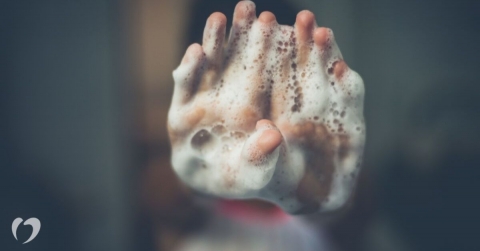Pre-Procedure Hygiene to Reduce Risk of Infections

When preparing for a cardiac procedure, whether a minimally invasive outpatient procedure or more invasive surgery, you probably have a lot of things on your mind. One thing you need to be aware of is hygiene and the important steps to take prior to your procedure.
Hygiene is important for regular daily life, of course. We’re all aware we need to shower and wash our hands after using the restroom and regularly throughout the day. We change our clothes and our sheets to keep them clean. These are all important hygiene activities for daily life, but surgery or any other medical procedure makes all of this even more critical.
Don’t let the outside in
When you have any sort of procedure done that involves an incision in your skin, it’s absolutely critical that your skin be as clean as possible. You’re opening up the inside of your body to the outside, which can allow bacteria on your skin to enter your bloodstream. It’s not normally a big deal if you have some bacteria on your skin—a certain amount of that happens in daily life, and your skin acts as a barrier. But when you go in for surgery, you have to be extra careful about hygiene.
If bacteria or foreign substances make their way into your body, even in small quantities, you increase the risk of infection. That’s the last thing you want to deal with after any procedure.
Basic pre-procedure hygiene
Pre-procedure hygiene may vary for different procedures, but there are some very basic guidelines that apply generally to all procedures.
First, a shower on the day of the procedure is critical. A bath is not recommended, as bath water allows bacteria to stay in the water and remain on your skin.
When you shower, you should wash your hair. Start with your hair and work your way down your body. Finishing with the hair can leave anything that was in your hair on your body, so you want to work from the top down. Pay special attention to fingernails, too, as those tend to get neglected.
After your shower, put on clean clothes. Don’t wear anything you’ve had on before. A fresh set of clothes will keep you from re-introducing any bacteria or foreign substances.
Depending on how invasive the procedure is, it may be important to avoid pets or tobacco as well. If there are more specific instructions, your doctor will make sure those are provided so you’re fully prepared for your procedure. Some procedures, such as surgeries and pacemaker or ICD placements, require washing with a particular soap and showering both the night before and morning of the procedure.
Avoid putting anything on that could re-introduce bacteria. That includes makeup, lotion, hairspray and deodorant, among other things.
Proper hygiene before a procedure will help you avoid infection and stay healthier following your procedure. If you have any questions about how to prepare for your specific procedure, contact your Oklahoma Heart Hospital doctor.




